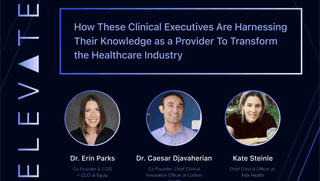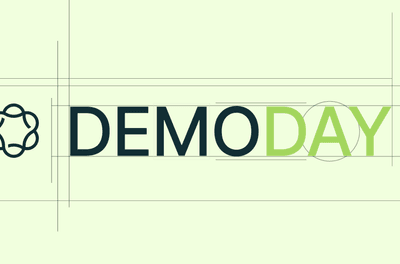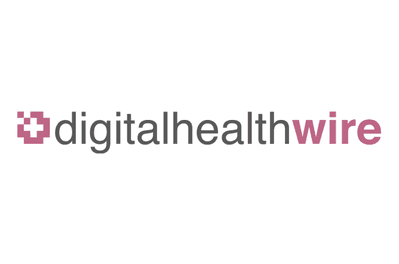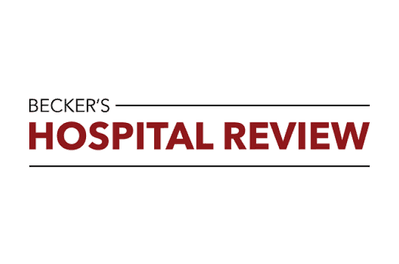How these clinical executives are harnessing their knowledge as a provider to transform the healthcare industry
Provider burnout is higher than ever, and organizations are struggling to keep up with the changing landscape of patient care. We talk with three clinicians about how they're solving operational burdens as providers and operations executives while meeting the diverse needs of patients today.
Doctors, therapists, nurses, and providers of all specialties are exhausted and overwhelmed with patient caseloads. These same providers are also the ones who are trying to advance healthcare to make it more accessible to more patients in fewer steps.
Yet, transforming an industry and increasing access to quality care requires that these already overloaded providers fill out applications, upload documents, or get fingerprinted, among many other things.
During the annual Medallion Elevate conference, we sat with three phenomenal clinicians to dive into how they solve operational burdens as providers and operations executives.
Dr. Caesar Djavaherian is from Carbon Health, a medical practice combining smart technology with modern, welcoming clinics to deliver a seamless experience—virtual and in-person care. Dr. Erin Parks is from Equip, a mental health center that helps families recover from eating disorders at home. Finally, Kate Steinle of Folx Health delivers an understanding and supportive healthcare experience to the LGBTQ+ community.
The conversation is below, and given the breadth of information, we've split it into three parts. If you're short on time, here are a few quick takeaways:
- The patient-provider relationship matters, and by creating opportunities to usher in diverse provider talent, providers can better meet the needs of all patients.
- Providers see telehealth as an avenue for a deeper connection and access. It's not just about speed and asynchronous care but how they create a stronger patient-provider connection.
- As leaders, empowering all employees, no matter where they are in the organization, to have a voice, respect the opinions of others is critical to an organization’s success and growth. Everyone deserves a say in how an organization runs.
If you enjoy this material, check out more sessions from the Medallion Elevate event. A lightly edited transcript of the session with Dr. Caesar Djavaherian, Dr. Erin Parks, and Kate Steinle follows. The conversation has been transcribed and edited to the best of our abilities. Please allow for a slight margin of human and machine error. Any questions or concerns, send an email to events@medallion.co for help.
Derek Lo: I'm excited to welcome Erin, Caesar, and Kate today. This session is the only one at our conference focusing specifically on clinicians. It's a special one. Before we begin, let's start with quick introductions.
Dr. Erin Parks: Hi, everyone. I'm Erin Parks. I am a clinical psychologist by training. I specialized in neuropsychology and worked in various hospital settings over the past 20 years, from VAs to children's hospitals. I ended my career in academic medicine at UC San Diego as a clinical faculty. I helped run their eating disorder programs–a lot of higher levels of care, so inpatient PHP and IOP.
I left the university in 2019 and founded Equip Health. We're a virtual eating disorder treatment provider, and while I absolutely loved my previous jobs in hospital settings, the big driver for me to start this was recognizing that evidence-based care for eating disorders was really siloed in a few academic institutions around the country and trying to figure out how to disseminate it, both physically or virtually, but also financially to more and more people.
So thanks for having us, Derek. I'm excited to be here.
Dr. Caesar Djavaherian: Hi, I'm Caesar. I'm an emergency medicine physician by training. I'm also a reformed academic, and I left New York Presbyterian in New York City to found or co-found what has become Carbon Health.
Carbon Health is a vertically integrated primary care urgent care company. We have 140-something locations around the country in 16 states where we use technology to drive innovation in healthcare delivery.
So I'm really excited to be here with you guys.
Kate Steinle Hello. My name is Kate Steinley. I'm a nurse practitioner by training and work at Folx Health. I'm the chief clinical officer there. It is a telehealth company that's focused on the LGBTQ+ community.
I've been there since the beginning, building the protocols and hiring the clinicians, and today I'm excited to talk through what it looks like to be a clinician who also helps run the clinical parts of it.
Providers need to reflect the communities they're treating
Derek Lo:
Thank you. Wonderful. Let's start with the most important lesson you learn as a clinician and how that has influenced how you've built your provider network.
Kate Steinle: Sure. As we build the clinician network at Folx, we have focused on specialized and expert providers in this field, who have a lot of years of experience in working and caring for the community and the LGBTQ+ community, and are passionate.
The providers are driven to care for this community, so I partly feel they see telehealth as an avenue for a deeper connection and access. It's not just about speed and asynchronous care but how they create that [patient-provider] connection.
I think that doesn't exist just with the clinicians we're hiring in the community or serving, but that [patient-provider connection] is what we're building here. It's different. We've found some great clinicians who deeply care about making those connections because they know that that's what's important to help a patient get on board, achieve their goals, and stay with treatment.
Dr. Erin Parks: I appreciate that, Kate. I think I'll add that being a provider for 20 years before starting Equip reminded me that I'm not everyone's cup of tea and that the treatment that we provide is really, really, really hard. So that relationship you have with your provider really matters.
Eating disorders, often a chronic condition in the youth, have the second highest mortality rate of any mental health illness. It's a hard treatment, so it's hard to get through it if you're also not jiving with your provider.
I think the lesson for me is remembering that not everyone likes my Midwestern enthusiasm. So [it's important] that we're hiring really diverse providers, like ethnic and racial diversity. We've also found gender diversity to be really important. About 40% of people with eating disorders are men. There are very few men treating people with eating disorders. We also know that eating disorders occur more frequently in transgender and nonbinary populations. We make sure we have providers that are gender nonconforming or transgender. And then we are making sure we have providers that are single parents that grew up poor, live in the Midwest, and not just coming from the coast.
I think that has been an important lesson. I think I'll also end with making sure we have providers of different work backgrounds. We can't only hire people from hospitals, or only hire people from private practice, or only hire people from the VA because you bring a different lens based on where you grew up.
Dr. Caesar Djavaherian: Yes, Erin, I love everything you said, and you, Kate, about this wonderful idea to make sure that your providers reflect the community they're treating. I think one additional thought is that as we scaled from when we opened, we had three clinicians. Now we have close to 500 around the country. [It was vital to] understand that culture matters in the early days and figure out how to instill a culture that scaled. One of our favorite things was in the early days when we had a 'no asshole' policy. We would state that to everyone who wanted to be hired.
Later on, we informally mentioned it once in a while. But that culture of respecting everyone's opinion, everyone's point of view regardless of where they were in the clinical staff [mattered.] Whether they were supervising providers, frontline clinicians, support staff, or in the back office, everyone's point of view mattered, and everyone deserved a say in how we ran the company. I think that's carried forward and allowed us to do in Mobile, Alabama, what we do in San Francisco.
Creating a culture where everyone has a voice is key to success
Derek Lo: Thanks for sharing all of that. Let's take this conversation out a bit wider. How has being a provider helped you personally or professionally? I'm curious about it in terms of thought leadership, setting your businesses' vision, and propelling the whole industry forward. Caesar, let's start with you.
Dr. Caesar Djavaherian: Sure. Thanks, Derek. I think it's important to have providers at the table, especially when you're building a company and a health technology. Sounds silly, but it happens not as often as it should. It happens rarely, but it's critical to ensure everyone's perspective is represented.
So if you're building amazing technology and not interacting with clinicians daily to understand their workflows, you'll lose something in that process. When I look back on our company, we functioned at our best when we had product marketing operations, clinical, PR, and finance in the same room. I remember having to do that when we created our Covid-19 response because, in February 2020, we gathered everyone in a room. [If I didn't] have a clinician voice there, we would have probably made our company very different. It [would] probably [be] much less successful.
Kate Steinle: As a clinician who is one of the company's leaders, I get to make fun of clinicians because I am one, right? So I think that gives me this weight where I'm like, God, clinicians complain so much, right? I can say that because I'm one of those complainers about EMR and all these things.
But really, I think just like you said, Caesar. It's about using the systems, seeing where those barriers are, seeing how efficient or non-efficient certain operations are, and seeing patients; we call them members. I'm still seeing patients but trying to cut down on that because I mostly do that at night. But I need to keep that to understand what we're talking about today.
So when we're talking about creating the roadmap for engineering, or we're talking about prioritizing this build over this build, like, I need to know that the data is showing us some things. Still, I also need to know what is the thing that frustrates me the most as I'm navigating the systems.
And I think bringing that forward and having that voice at the table and pulling that from my team and for myself as a clinician is super helpful.
Dr. Erin Parks: Oh, Cesar and Kate, I like both answers very much. I think the only thing I'll add to it is understanding the mixed feelings you feel when you're learning a new treatment. I considered myself a very well-trained provider who learned many evidence-based treatments for traumatic brain injury and depression, and anxiety.
I was absolutely shocked when I fell into eating disorders. And I'm like, oh, I've never heard of SBT, the evidence-based treatment for eating disorders, and it truly is the number one treatment. I had never heard of it before and was caught flat-footed in my interview.
I remember that [experience] when we bring in new providers who think they know how to treat eating disorders. We have to say, like, great, I know you're well trained, and I know you're great at your job, and we're going to teach you this evidence-based treatment. It doesn't mean that everything they learned previously was crap but just recognizing that, I guess this is why we call it practice.
As clinicians, we're always learning. We're always practicing and evolving.
About Medallion Elevate: The Future of Healthcare Operations
At Medallion's inaugural debut, Elevate: The Future of Healthcare Operations, healthcare executives, founders, and leaders came together and highlighted the collective optimism of an industry that's ready to elevate and advance the industry.
It represented actionable insights, disruptive ideas, and ground-breaking insights from some of the best healthcare leaders, visionaries, investors, and founders. For more information and to view the sessions on-demand, visit: https://elevate.medallion.co/events/medallion-elevate-2022/registration



